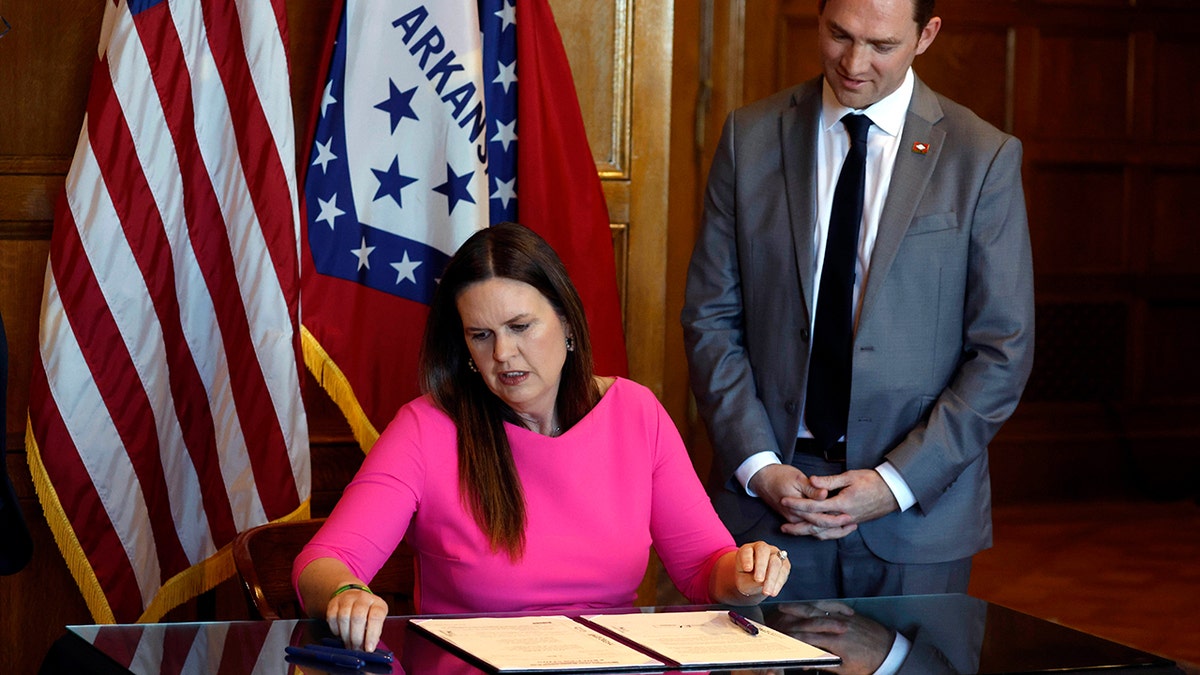Fox News Flash top headlines for June 30
Fox News Flash top headlines are here. Check out what's clicking on Foxnews.com.
- Arkansas Gov. Sarah Huckabee Sanders signed a law that requires parental permission for minors to create new social media accounts on April 12, 2023.
- Netchoice, a tech group whose members include Meta, TikTok, and Twitter, is suing the state of Arkansas over the new law.
- Netgroup's lawsuit argues that the law violates the constitutional rights of social media users and singles out certain types of speech.
A tech industry trade group sued Arkansas on Thursday challenging a new state law that requires parental permission for minors to create social media accounts.
NetChoice, a group whose members include Facebook parent Meta, TikTok and Twitter, filed a federal lawsuit over the measure signed by Republican Gov. Sarah Huckabee Sanders in April. The law requires social media companies to contract with third-party vendors to perform age verification checks on new users. The requirement is set to go into effect on Sept. 1.
The lawsuit argues that the new requirement violates the constitutional rights of users and singles out types of speech that would be restricted.
"S.B. 396 imposes onerous obligations on ‘social media companies’ that severely burden both minors’ and adults’ First Amendment rights to speak, listen, and associate without government interference on the widely used online services that it covers," the lawsuit said.
Arkansas' law is similar to a first-in-the-nation restriction that was signed into law earlier this year in Utah. That law is not set to take effect until March 2024. NetChoice last year filed a lawsuit challenging a California law requiring tech companies to put kids’ safety first by barring them from profiling children or using personal information in ways that could harm children physically or mentally.

Gov. Sarah Huckabee Sanders signs a bill requiring age verification before creating a new social media account at a ceremony on April 12, 2023, in Little Rock, Arkansas. (Thomas Metthe/Arkansas Democrat-Gazette via AP)
Republican Attorney General Tim Griffin, who was named as the defendant in the lawsuit, said he looked forward to "vigorously defending" the law.
ARKANSAS PLANE CRASH KILLS PILOT, INJURES PILOT'S DAUGHTER
The law is being challenged as social media companies have faced increasing scrutiny over their platforms' effect on teen mental health, one of the concerns Sanders cited as she pushed for the legislation. The governor said Thursday that she was confident in Griffin's ability to defend the law.
"For years, social media companies have gotten away with exploiting kids, and it’s proven to have a negative impact on their mental health," Sanders said in a statement. "I promised to hold Big Tech accountable to protect kids and empower parents."
Last month, U.S. Surgeon General Vivek Murthy warned that there is not enough evidence to show that social media is safe for children and teens and called on tech companies to take "immediate action to protect kids now." Meta on Tuesday announced it was adding some new parental supervision tools and privacy features to its platforms.
The state earlier this year filed lawsuits against Meta and TikTok, claiming the social media companies misled consumers about the safety of children on their platforms and the protection of users’ private data.
CLICK HERE TO GET THE FOX NEWS APP
Arkansas' restrictions would only apply to social media platforms that generate more than $100 million in annual revenue. It also wouldn’t apply to certain platforms, including LinkedIn, Google and YouTube.
The lawsuit says the distinctions the measure makes between types of platforms that must adhere to the age-verification requirement and those that don't "make no sense in theory or in practice."
Social media companies that knowingly violate the age verification requirement could face a $2,500 fine for each violation under the new law. The law also prohibits social media companies and third-party vendors from retaining users' identifying information after they’ve been granted access to the social media site.

